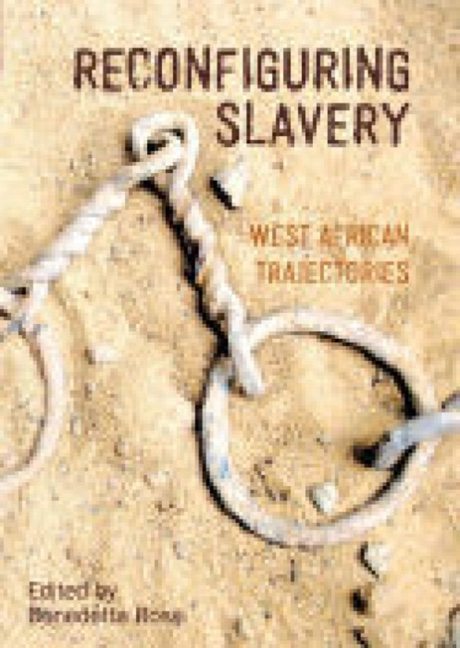Book contents
- Frontmatter
- Content
- List of Figures
- Notes on Contributors
- Preface
- A Note on Language
- Preface to the Second Edition
- 1 Introduction: Rethinking Slavery in West Africa
- 2 Slave Descent and Social Status in Sahara and Sudan
- 3 African American Psychologists, the Atlantic Slave Trade and Ghana: A History of the Present
- 4 After Abolition: Metaphors of Slavery in the Political History of the Gambia
- 5 Islamic Patronage and Republican Emancipation: The Slaves of the Almaami in the Senegal River Valley
- 6 Curse and Blessing: On Post-slavery Modes of Perception and Agency in Benin
- 7 Contemporary Trajectories of Slavery in Haalpulaar Society (Mauritania)
- 8 Slavery and Politics: Stigma, Decentralisation and Political Representation in Niger and Benin
- 9 Slavery and Migration: Social and Physical Mobility in Ader (Niger)
- 10 Discourses on Slavery: Reflections on Forty Years of Research
- Glossary of Foreign Words
- Index
10 - Discourses on Slavery: Reflections on Forty Years of Research
- Frontmatter
- Content
- List of Figures
- Notes on Contributors
- Preface
- A Note on Language
- Preface to the Second Edition
- 1 Introduction: Rethinking Slavery in West Africa
- 2 Slave Descent and Social Status in Sahara and Sudan
- 3 African American Psychologists, the Atlantic Slave Trade and Ghana: A History of the Present
- 4 After Abolition: Metaphors of Slavery in the Political History of the Gambia
- 5 Islamic Patronage and Republican Emancipation: The Slaves of the Almaami in the Senegal River Valley
- 6 Curse and Blessing: On Post-slavery Modes of Perception and Agency in Benin
- 7 Contemporary Trajectories of Slavery in Haalpulaar Society (Mauritania)
- 8 Slavery and Politics: Stigma, Decentralisation and Political Representation in Niger and Benin
- 9 Slavery and Migration: Social and Physical Mobility in Ader (Niger)
- 10 Discourses on Slavery: Reflections on Forty Years of Research
- Glossary of Foreign Words
- Index
Summary
Many of the publications on the topic of slavery in African Studies during the 1970s were primarily concerned to analyse the socio-legal and politicaleconomic positioning of slaves in various pre-colonial or proto-colonial settings (e.g. Meillassoux, 1975; Miers and Kopytoff, 1977a). They were therefore written either from an historical perspective or by using a rather vaguely defined notion of the ethnographic present. In this literature particular emphasis was placed on exploring the question of whether pre-colonial African systems of slavery were comparable, in terms of social status and degree of exploitation, to the systems of plantation slavery in the New World or in antiquity (e.g. Finley, 1968). On the other hand, what one was encountering in relation to slavery as a fieldworker in Africa during the 1960s and 70s was, for the most part, more related to discourses on slavery than to its continued practice. Nonetheless, it remained the case that the concept of ‘slave’ was still quite prominent in daily usage in many of the African social contexts where I was working. And in the late 1980s, during two periods of field research in the Caribbean, I found this also to be the case. This experience in a social setting which otherwise stood in marked contrast to my work in Africa further piqued my interest in ‘slavery’ as a keyword. In this essay I draw on my experiences of field research in Africa and the Caribbean over forty years to reflect on the social significance of contemporary usages of notions of ‘slavery’ that I have encountered in diverse social contexts.
My essay considers a series of cases or instances drawn from my fieldnotes where I have encountered a prominent reference to ‘slave/slavery’. These range from a case of contested succession to a village chieftaincy, through mobilisation of the word in situations of inter-ethnic conflict or extortion, through cases of contestation over natural resources, through focus on the topic by campaigning non-governmental organisations, and on to competing interpretations of the term within the context of a public festival in Trinidad celebrating the 150th anniversary of the abolition of slavery. In line with the general theme of this book, this material raises points for reflection on some recent African trajectories of slavery, with particular emphasis on how the concept has become variably embodied in institutions and discourses in diverse social settings.
- Type
- Chapter
- Information
- Reconfiguring SlaveryWest African Trajectories, pp. 207 - 224Publisher: Liverpool University PressPrint publication year: 2009



